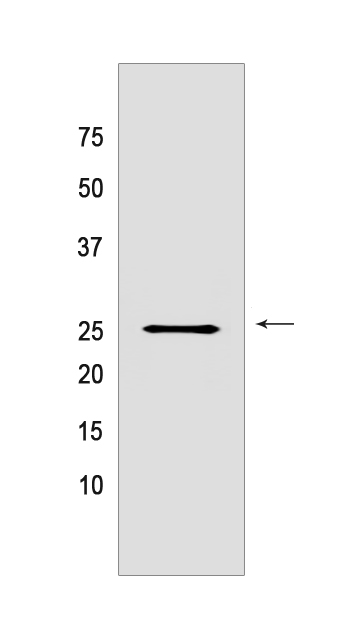Plunc Rabbit mAb [PUV9]Cat NO.: A98341
Western blot analysis of extracts from A549 cells lyastes.using Plunc Rabbit mAb [PUV9] at dilution of 1:1000 incubated at 4℃ over night
Product information
Protein names :BPIFA1,LUNX,NASG,PLUNC,SPLUNC1,SPURT,UNQ787/PRO1606,BPIA1_HUMAN,BPI fold-containing family A member 1
UniProtID :Q9NP55
MASS(da) :26,713
MW(kDa) :25 kDa
Form :Liquid
Purification :Protein A purification
Host :Rabbit
Isotype :IgG
sensitivity :Endogenous
Reactivity :Human
- ApplicationDilution
- 免疫印迹(WB)1:1000-2000
- The optimal dilutions should be determined by the end user
Specificity :Antibody is produced by immunizing animals with a synthetic peptide of Human Plunc.
Storage :Antibody store in 10 mM PBS, 0.5mg/ml BSA, 50% glycerol. Shipped at 4°C. Store at-20°C or -80°C. Products are valid for one natural year of receipt.Avoid repeated freeze / thaw cycles.
WB Positive detected :A549 cells lyastes
Function : Lipid-binding protein which shows high specificity for the surfactant phospholipid dipalmitoylphosphatidylcholine (DPPC) (PubMed:25223608). Plays a role in the innate immune responses of the upper airways (PubMed:23499554, PubMed:23132494). Reduces the surface tension in secretions from airway epithelia and inhibits the formation of biofilm by pathogenic Gram-negative bacteria, such as P.aeruginosa and K.pneumoniae (PubMed:23499554, PubMed:23132494, PubMed:27145151). Negatively regulates proteolytic cleavage of SCNN1G, an event that is required for activation of the epithelial sodium channel (ENaC), and thereby contributes to airway surface liquid homeostasis and proper clearance of mucus (PubMed:24124190, PubMed:24043776). Plays a role in the airway inflammatory response after exposure to irritants (PubMed:11425234). May attract macrophages and neutrophils (PubMed:23132494)..
Tissue specificity :Highly expressed in lung, upper airways and nasopharyngeal regions, including trachea and nasal epithelium (at protein level) (PubMed:11018263, PubMed:11251963, PubMed:12409287, PubMed:11425234, PubMed:26559477). Specifically expressed in the secretory ducts and submucosal glands of tracheobronchial tissues (at protein level) (PubMed:12409287, PubMed:11425234). Also expressed in the eye where it is detected in lacrimal gland, eyelid, conjunctiva and cornea (at protein level) (PubMed:26559477). Specifically localizes to epithelial cell layers in cornea, eyelid (basal epithelium) and conjunctiva (at protein level) (PubMed:26559477). Detected within acinar cells and ducts in the lacrimal and Meibomian glands (at protein level) (PubMed:26559477). In lung, shows highest expression in the trachea and progressive decrease from proximal (bronchial) to distal (bronchiolar) airways (PubMed:12409287). Also expressed in lung cancers and some other types of cancer (PubMed:11251963)..
Subcellular locationi :Secreted.
IMPORTANT: For western blots, incubate membrane with diluted primary antibody in 1% w/v BSA, 1X TBST at 4°C overnight.


